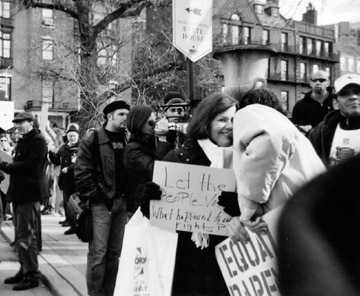The Massachusetts Legislature engaged in three days of impassioned debate at the Constitutional Convention last week as thousands of people, including UMass Boston’s Queer Student Union, descended upon the State House to show support for and opposition to same-sex marriages.
As photographers snapped pictures and video cameras rolled, demonstrators spoke of the Bible, sodomy, civil rights, and the Constitution.
Some demonstrators bickered but the handful of police present helped maintain a generally peaceful atmosphere.
“The issue of same-sex marriage rights is fundamentally a civil rights issue,” stated Colleen O’Malley, head of the QSU. She continued, “No amendment to the Constitution should be ratified that lessens the rights of American citizens.”
Inside the State House, openly gay State Senator Jarred Barrios (D-Cambridge) dashed down the hall during a recess, stopping for a brief comment on how he was feeling in regards to the proceedings.
“Very tired, very happy thus far…the joint legislature has rejected all efforts to write discrimination into our constitution,” he said, hours before the Legislature adjourned at midnight without having reached a consensus. “We still have many challenges ahead of us, and we remain resolute.” Barrios received a UMass Boston Chancellor’s Medal for his work in affordable housing, health care, and education at last year’s commencement.
On Tuesday and Thursday Jennifer Raymond, a researcher for the Center for Social Policy at the McCormack Institute of Public Affairs and a PhD student in public policy, was at the State House and watched from the gallery as her legislators debated gay marriage “as an abstract issue.”
Said Raymond, “To me, it’s truly important to recognize this issue. The court has stated that there is no rational basis to deny those rights.”
“I feel like we have great numbers today, we came out in strength,” remarked one enthusiastic same-sex marriage supporter on Wednesday. “We all came with signs, everybody wants to be here and they’re sticking here.”
“I’m not anti-gay you know,” said one opponent of same-sex marriage. “It’s a free country, people have a right to do what they want, but I think it’s immoral and inappropriate for a gay man to marry another gay man.”
“It has nothing to do with religion as far as I’m concerned,” another critic added. “I just think that the relationship between a man and a woman deserves a privileged place in society, meaning marriage.”
Supporters of same-sex marriage, however, see the debate in different terms.
“This is our moment to get our rights and to establish ourselves as a community within Massachusetts,” a supporter of same-sex marriage at the State House said. “We’re here to stand up and show everyone inside that building we do have a voice and we do vote.”
In November 2003, the Massachusetts Supreme Judicial Court ruled, “Barring an individual from the protections, benefits, and obligations of civil marriage solely because that person would marry a person of the same sex violates the Massachusetts Constitution.”
Chief Justice Margaret Marshall, who wrote the decision, was referring to roughly 1400 rights enjoyed by married couples that include tax and immigration benefits, property transfer rights, and the ability to make medical decisions for partners.
The ruling provoked a flurry of opposition from religious and conservative political groups.
President George W. Bush, in his 2004 State of the Union address, pledged support for a federal amendment that would define marriage as strictly between one man and one woman. If passed, the amendment would overturn Massachusetts’ ruling.
“I think that the Republicans are going to try to make a national issue of gay marriage. I’m not entirely sure how successful they’ll be at doing it. There are a lot of things that have an impact on elections, and it’s often difficult for politicians to simply decide to emphasize one issue and have that work for them,” said James Ward, chair of the political science department at UMass Boston. There are voters for whom gay marriage is the only issue, but there are others, Ward continued, “less interested in that and more concerned about other things, such as U.S. involvement in Iraq, or the economy, and those are factors, too.”
Charles Cnudde, UMass Boston political science professor said an amendment does not rise to the constitutional level. “If I was in the Legislature, I wouldn’t vote for it,” he said.
On Wednesday and Thursday in Boston, legislators voted on a series of proposed amendments aimed at defining marriage as heterosexual.
Outside the State House, one critic of the SJC ruling remarked, “I believe that if we allow the judges to legislate from the bench, we are in fact, circumventing the due process of the law…We will witness a constitutional erosion.”
Over the three days, however, Massachusetts legislators sided with the judges, narrowly rejecting all proposed amendments that would override the November ruling. On Friday, the lawmakers adjourned the convention until March 11. If the SJC decision is intact after its remaining challenges, Massachusetts will begin issuing marriage licenses for same-sex couples on May 17.
“It’s obviously a very divisive issue in Massachusetts, at least as far as the Legislature is concerned, because the Legislature thus far, as of yesterday, was unable to come up with any action on either side of the issue for them to vote upon and pass,” said Ward.
Cnudde added, “I think most public officials would like this to go away.”
G. Dumcius contributed to this report.





















































